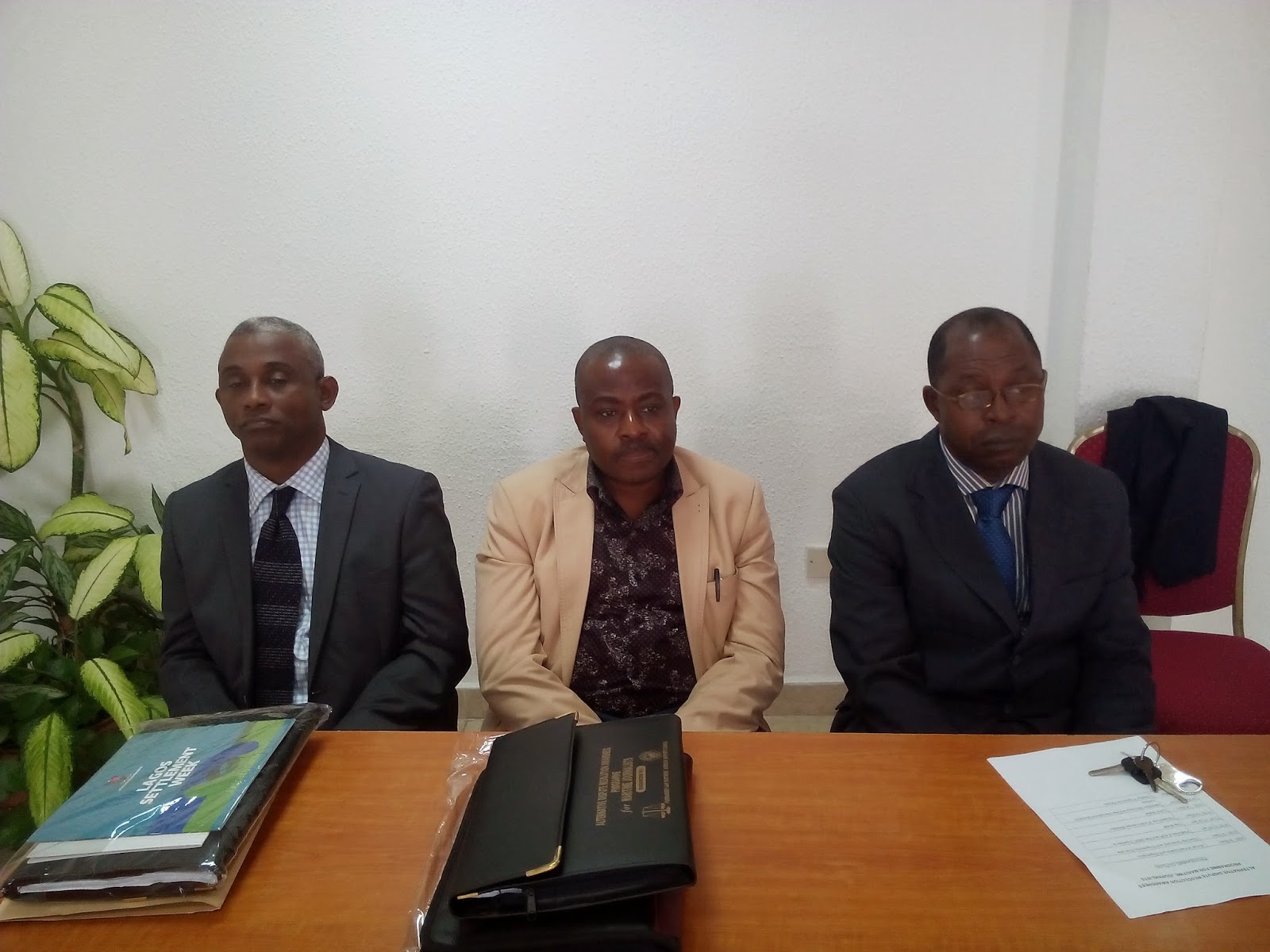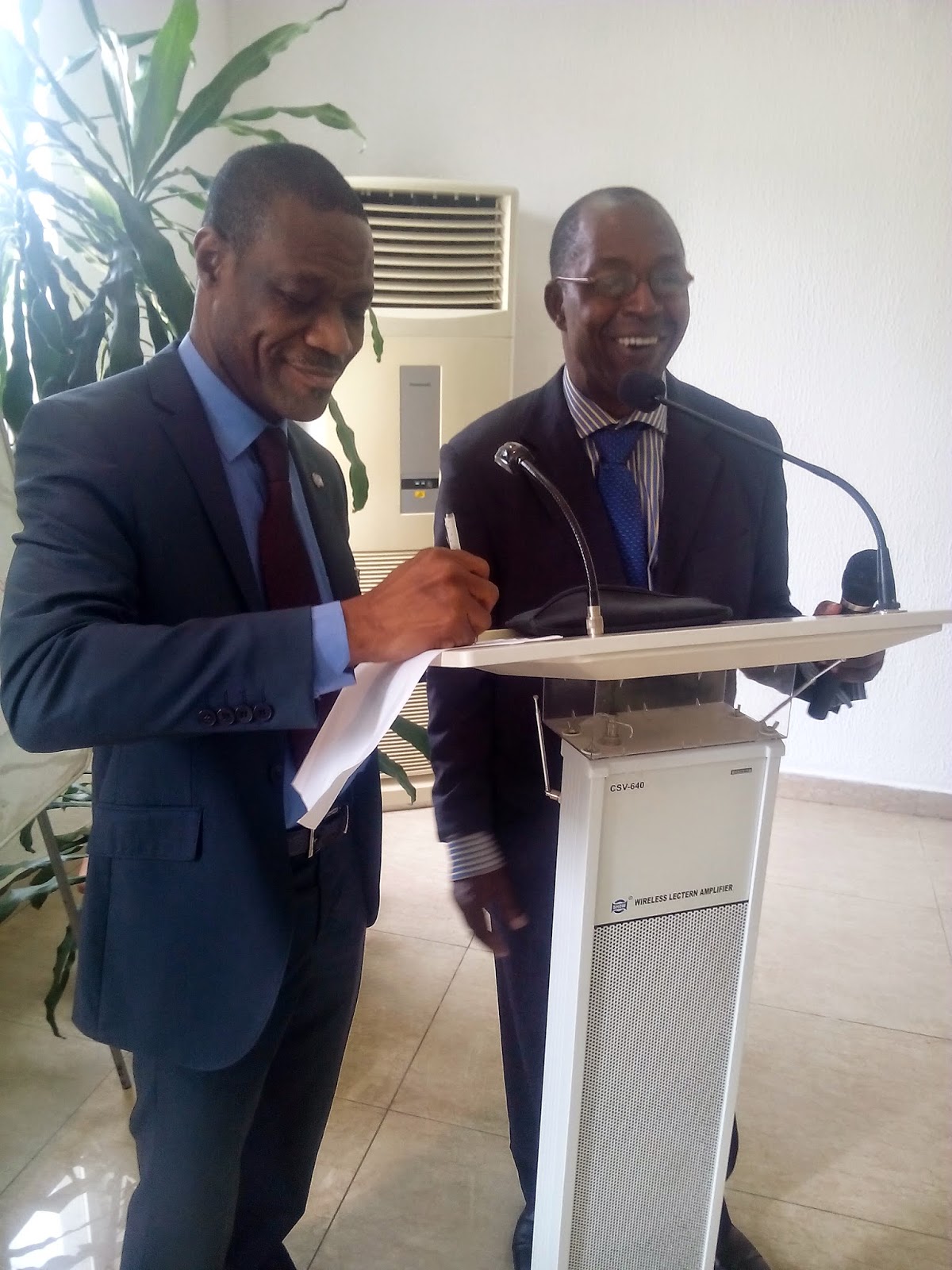The Nigeria Shippers’ Council (NSC) says the ADR
mechanisms; particularly mediation remains a preferred option for settlement of
commercial disputes among stakeholders in the maritime industry.
mechanisms; particularly mediation remains a preferred option for settlement of
commercial disputes among stakeholders in the maritime industry.
The Executive Secretary of the NSC, Mr Hasan Bello,
made the remark at a one-day awareness training programme on Alternative
Dispute Resolution (ADR) organised by the Forwarder Law Partners for maritime
journalists, and supported by the NSC.
made the remark at a one-day awareness training programme on Alternative
Dispute Resolution (ADR) organised by the Forwarder Law Partners for maritime
journalists, and supported by the NSC.
Speaking at the event which took place at the Lagos
Multi-Door Courthouse (LMDC) on Sept. 11, the Executive Secretary reiterated
the Council’s support to create awareness about the ADR.
Multi-Door Courthouse (LMDC) on Sept. 11, the Executive Secretary reiterated
the Council’s support to create awareness about the ADR.
Bello who was represented by Barrister Uwe Akan, a
Deputy Director from the legal department of the NSC, said the Council
supported the programme because of its interest in ensuring a speedy resolution
of commercial disputes among parties in the maritime sector, and at low cost.
Deputy Director from the legal department of the NSC, said the Council
supported the programme because of its interest in ensuring a speedy resolution
of commercial disputes among parties in the maritime sector, and at low cost.
“The interest of the Nigerian Shippers’ Council in
this programme cannot be over-emphasised. This is because the Nigerian Shippers’
Council has an enduring stake in the resolution of commercial disputes among
parties in the maritime sector speedily without high cost,” he said.
this programme cannot be over-emphasised. This is because the Nigerian Shippers’
Council has an enduring stake in the resolution of commercial disputes among
parties in the maritime sector speedily without high cost,” he said.
The Executive Secretary further said that a lot more
commercial disputes could be resolved through the ADR, with the right inputs of
the stakeholders.
commercial disputes could be resolved through the ADR, with the right inputs of
the stakeholders.
He urged the media to educate the stakeholders on the
benefits of the ADR in order to gain their support and acceptance of it.
benefits of the ADR in order to gain their support and acceptance of it.
In her presentation, Mrs Adeyinka Aroyewun, Deputy
Director, LMDC, encouraged that disputing parties should embrace any of the ADR
options; negotiation, arbitration, mediation, early neutral evaluation and
hybrid processes than going for litigation in settlement of disputes either in
businesses or among individuals.
Director, LMDC, encouraged that disputing parties should embrace any of the ADR
options; negotiation, arbitration, mediation, early neutral evaluation and
hybrid processes than going for litigation in settlement of disputes either in
businesses or among individuals.
According to her, the judicial reform in Lagos State
made the Lagos Multi-Door Courthouse Law come alive in 2007, to give legal
backing to the ADR.
made the Lagos Multi-Door Courthouse Law come alive in 2007, to give legal
backing to the ADR.
She noted that the ADR was a vital part of traditional
Nigerian dispute resolution channels until the coming of the colonial masters,
who relegated those channels to the background.
Nigerian dispute resolution channels until the coming of the colonial masters,
who relegated those channels to the background.
Her words: “ADR is not alien to the Nigerian society;
in the three major tribes in Nigeria, it was at the heart of the traditional
channels of dispute resolution, visible in its sensitivity, promptness and
access.”
in the three major tribes in Nigeria, it was at the heart of the traditional
channels of dispute resolution, visible in its sensitivity, promptness and
access.”
She said change however set in to revive the ADR
following delay, inappropriateness and cost associated with litigation. She
also stated the fact that besides negative publicity from litigation,
relationships were destroyed.
following delay, inappropriateness and cost associated with litigation. She
also stated the fact that besides negative publicity from litigation,
relationships were destroyed.
According to her, the introduction of the Lagos
Settlement Week (LSW) in 2009 made it possible for cases that had otherwise
been in the court for many years, to be resolved.
Settlement Week (LSW) in 2009 made it possible for cases that had otherwise
been in the court for many years, to be resolved.
The LSW is a week set aside by the Chief Judge of
Lagos State for specific courts to clear their backlog of cases through means
including return to the Lagos Multi-Door Courthouse for possible resolution
through mediation, arbitration or any other ADR procedure.
Lagos State for specific courts to clear their backlog of cases through means
including return to the Lagos Multi-Door Courthouse for possible resolution
through mediation, arbitration or any other ADR procedure.
In his paper, Barrister Valentino Buoro, Managing
Counsel, Forwarder Law Partners and Associate Convenor, Standing Conference of
Mediation Advocates (SCMA) noted that mediation had gained more ground over
arbitration in ADR, which could be used to settle a lot of matters.
Counsel, Forwarder Law Partners and Associate Convenor, Standing Conference of
Mediation Advocates (SCMA) noted that mediation had gained more ground over
arbitration in ADR, which could be used to settle a lot of matters.
He said, “Mediation can be utilised in resolving a
wide range of disputes including banking and insurance-related disputes;
landlord and tenant matters; debt recoveries; libel and slander; employment and
trade disputes; medical negligence; contracts enforcement; family and
succession disputes.”
wide range of disputes including banking and insurance-related disputes;
landlord and tenant matters; debt recoveries; libel and slander; employment and
trade disputes; medical negligence; contracts enforcement; family and
succession disputes.”
Appreciating efforts by the NSC to institutionalise
ADR in the maritime sector, Buoro called for an urgent establishment of a
Maritime Panel of Neutrals and a Roll of Maritime Mediation Advocates.
ADR in the maritime sector, Buoro called for an urgent establishment of a
Maritime Panel of Neutrals and a Roll of Maritime Mediation Advocates.
He said the challenges between the various segments of
the industry would be best resolved by a structured process where industry
disputes are managed by industry professionals who adequately understand the
industry’s processes.
the industry would be best resolved by a structured process where industry
disputes are managed by industry professionals who adequately understand the
industry’s processes.
Speaking from the perspective of a non-lawyer, Akin
Olawore, an accredited mediator and SCMA board member, said understanding a
dispute first before attempting to resolve or prevent it was important. He also
said that dispute was a result of perception rather than facts.
Olawore, an accredited mediator and SCMA board member, said understanding a
dispute first before attempting to resolve or prevent it was important. He also
said that dispute was a result of perception rather than facts.
Olawore noted that people did not get their rights in
litigation cases because “A litigant
cedes his right of hearing to his counsel and remains an observer in the
determination of his fate.”
litigation cases because “A litigant
cedes his right of hearing to his counsel and remains an observer in the
determination of his fate.”
He however said that mediation was more satisfying,
more effective, more workable, more flexible and more durable than an order
imposed by a court or other tribunals.
more effective, more workable, more flexible and more durable than an order
imposed by a court or other tribunals.


